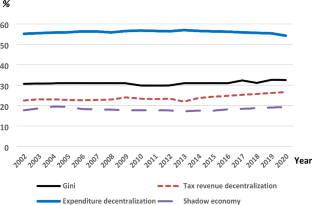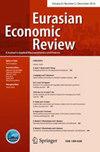经合组织国家的财政分权与收入不平等:影子经济重要吗?
IF 2.5
Q2 ECONOMICS
引用次数: 0
摘要
财政分权对收入不平等的影响一直存在争议,特别是它们可能取决于财政工具和其他因素。考虑到影子经济(在正规渠道之外运作)的存在,本文探讨了各级政府支出和税收的分配是否真正缓解了收入不平等,还是在无意中加剧了收入不平等。由于财政分权的大幅增加,以及对经合组织国家内部收入不平等加剧和影子经济日益增长的担忧,该研究重点关注了2002年至2020年期间23个经合组织国家。结果表明:(1)税收分权加剧了收入不平等;支出分权大大减少了收入不平等;(三)影子经济正向影响收入不平等;(四)影子经济加剧了税收分权对收入平等的不利影响,削弱了支出分权对收入平等的有利影响;(v)阈值为18.53%,即只要影子经济低于该阈值,支出分散化就会缓解收入不平等,但高于该阈值,支出分散化就会加剧收入不平等。这些发现表明,税收分权可能不是解决收入不平等问题的灵丹妙药,而在控制影子经济的情况下,支出分权则有希望。这些见解要求在财政分权领域,特别是在影子经济的背景下,谨慎地制定政策,以促进更公平的未来。本文章由计算机程序翻译,如有差异,请以英文原文为准。

Fiscal decentralization and income inequality in OECD countries: does shadow economy matter?
The impacts of fiscal decentralization on income inequality have been debated, especially they can depend on fiscal tools and other factors. This paper explores whether the allocation of government spending and tax revenue at different levels of government truly alleviates income inequality or inadvertently exacerbates it, considering the presence of the shadow economy – which operates outside formal channels. The study focuses on 23 OECD countries over the period 2002–2020 due to the significant surge in fiscal decentralization, and the growing concerns regarding rising income inequality and the shadow economy within OECD countries. Results show that: (i) tax revenue decentralization increases income inequality; (ii) expenditure decentralization significantly reduces income inequality; (iii) income inequality is positively affected by shadow economy; (iv) the shadow economy intensifies the detrimental effect of tax revenue decentralization on income equality, and it weakens the beneficial effect of expenditure decentralization on income equality; (v) the threshold is 18.53%, meaning that expenditure decentralization abates income inequality as long as the shadow economy is below this threshold, but above this level, expenditure decentralization exacerbates income inequality. These findings suggest that tax revenue decentralization may not be the silver bullet for combating income inequality, whereas expenditure decentralization holds promise when the shadow economy is controlled. These insights call for cautious policymaking in the realm of fiscal decentralization, particularly in the context of the shadow economy, to foster a more equitable future.
求助全文
通过发布文献求助,成功后即可免费获取论文全文。
去求助
来源期刊

Eurasian Economic Review
ECONOMICS-
CiteScore
6.00
自引率
2.90%
发文量
24
期刊介绍:
The mission of Eurasian Economic Review is to publish peer-reviewed empirical research papers that test, extend, or build theory and contribute to practice. All empirical methods - including, but not limited to, qualitative, quantitative, field, laboratory, and any combination of methods - are welcome. Empirical, theoretical and methodological articles from all fields of finance and applied macroeconomics are featured in the journal. Theoretical and/or review articles that integrate existing bodies of research and that provide new insights into the field are highly encouraged. The journal has a broad scope, addressing such issues as: financial systems and regulation, corporate and start-up finance, macro and sustainable finance, finance and innovation, consumer finance, public policies on financial markets within local, regional, national and international contexts, money and banking, and the interface of labor and financial economics. The macroeconomics coverage includes topics from monetary economics, labor economics, international economics and development economics.
Eurasian Economic Review is published quarterly. To be published in Eurasian Economic Review, a manuscript must make strong empirical and/or theoretical contributions and highlight the significance of those contributions to our field. Consequently, preference is given to submissions that test, extend, or build strong theoretical frameworks while empirically examining issues with high importance for theory and practice. Eurasian Economic Review is not tied to any national context. Although it focuses on Europe and Asia, all papers from related fields on any region or country are highly encouraged. Single country studies, cross-country or regional studies can be submitted.
 求助内容:
求助内容: 应助结果提醒方式:
应助结果提醒方式:


